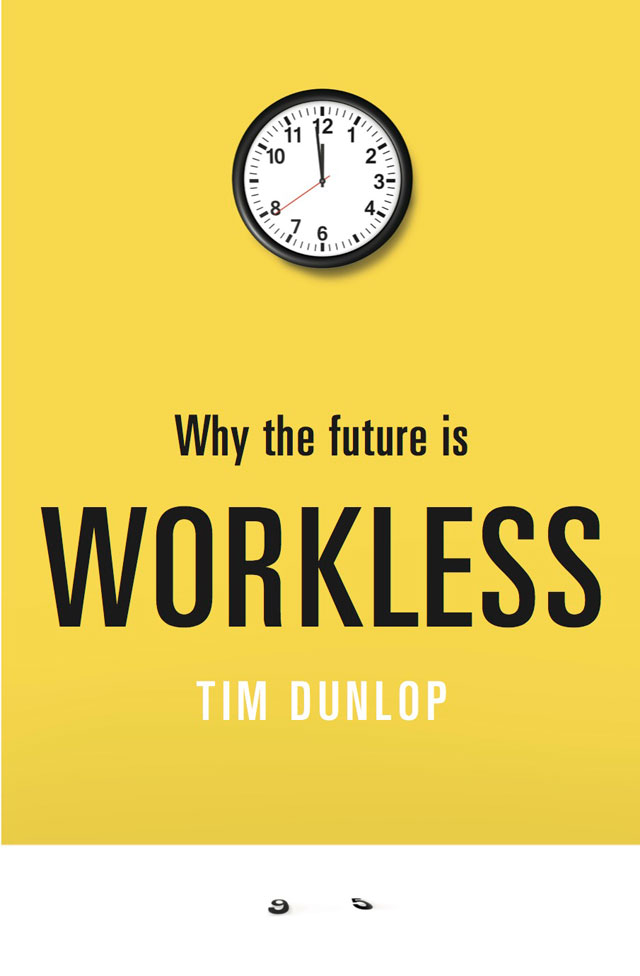5 Minutes with Tim Dunlop

Since completing his PhD at the University of Canberra in 2001, Tim Dunlop has had a successful career in writing. Finding an interest in blogging and 'new media' while completing his thesis, Tim moved to Washington DC and began a blog called The Road to Surfdom, which is now held in the archives of the National Library of Australia. Finding early success, Tim moved back to Australia where he was hired as a blogger by News Ltd; becoming the first independent Australian blogger to be hired by a mainstream media organisation.
A regular columnist for the ABC online site, The Drum, Tim also teaches at a postgraduate level at the University of Melbourne in The Centre for Advancing Journalism. He is the founder of Pidgin Podcasts and produces a number of podcast shows, including Washington Dreaming and Pidgin Politics.
His passion for the media has extended into two books. The first published in 2013 called The New Front Page: New Media and the Rise of the Audience, which documents the early history of new media and is used in journalism schools around the world. His second book is due to be released in September 2016 titled Why the Future is Workless, questions the future of employment.
We recently spoke to Tim about his new book, politics and the future of Australia.

Can you tell us about your new book 'Why the Future Is Workless'?
Basically I argue that because of changes in technology (not just robotics and the like, but also the shift from manufacturing to more information and knowledge-based forms of wealth creation) we are going to need far fewer people to work in order to produce the things we need. We are therefore going to need new ways, other than a job with an income, to be able to distribute wealth. I look at things like basic income as a way of addressing such developments. The underlying argument is that we have to stop pretending that 'jobs and growth' are going to continue indefinitely and we have to reorganise society accordingly.
You mention the impact of developing technology on work and employment; can you give us some examples of how you see this playing out, and what it might mean for the everyday Joe Worker and the world we live in?
There is a lot of research on this, and not everyone agrees that jobs will disappear, insisting that new jobs will be created. I think new jobs will definitely appear, just not in sufficient numbers to employ everyone: technology means we will be able to do more with less (that is, less people). Driverless vehicles, for example mean fewer jobs in everything from Ubers to truck driving and transportation. There are already 3D printers that can print houses and roads, which results in fewer construction jobs. There is software that can do the work of junior lawyers, searching case law. There is software that can write news stories about sport and about finance (it is already being used). There are programs that diagnose and treat post-traumatic stress and robots are already performing things like prostate surgery. Technology has always replaced jobs; but advances in computer processing mean that the next phase of this will be different.
There's been a massive increase in activity in the so-called "sharing economy" thanks to services such as AirBnB and Uber. What do you think this means for the future of work and the ways that we live our lives?
I argue these systems can only exist because of failures elsewhere in the labour market. They are therefore useful for employing people who can't get other work, or who want to supplement their income, but there is a real issue in the security and conditions of employment they provide. They can be very exploitative. The underlying principle of 'sharing' has applications in lots of areas, but we need to be smarter in how we use it. There is also the fact that Uber is already one of the biggest investors in driverless vehicles and so they already looking to replace workers. Bottom line is, these platforms may be useful, but they aren't going to solve our issues around employment.
What do you think common workplaces (for example, an open plan office) might look like in 20 or even 30 years' time? What about an average work day? Will we be freed of office drudgery and the 9-5 grind?
I think we have to embrace the possibility and move beyond our current "work ethic" that says having an ongoing job makes us a good citizen and a good person. In a world where there is far less work, that is a recipe for disaster. I think we should embrace the technology, let the robots do the work, and find other ways to distribute wealth.
What technological development or piece of technological engineering are you most excited about? Does any of it scare you?
3D printing is likely to have incredible applications, and it is sort of cool. None of the tech scares me, but I do worry that we are so wedded to a work ethic that we will take too long to adapt to the workless future, that it will be like climate change, where some people will be in denial about what is happening. So what scares me is the politics of change, not the technology driving it.
The state of Australian politics has been something of a circus for the last 5 or so years. What effect do you think this is having on the population, the democratic ideal, and the population's belief in democracy above all other forms of government?
I think it has damaged our democracy, but it is important to realise that the circus you mention is being driven by some fundamental societal changes. Nations are increasingly integrated into the world economy and the power of governments to influence things at home is substantially diminished. Our economy is global, and our politics are local, and it is a system that is coming up against the limits of that inherent contradiction. The circus arises because of this disconnect. Governments have less control over the economy, but still retain power over things like law and order and immigration. Thus we get this huge government concentration on things like border protection and surveillance or on 'law and order' crackdowns as we are seeing in Sydney with their lockout laws and the like. It is a recipe for more draconian government unless we do something about it.
Do you have any advice for a current student or new graduate looking to build a career in political commentary, journalism or blogging?
It helps to build a web presence across a range of platforms and to develop an expertise in a particular area of policy. Always write for your audience and keep it engaging without dumbing things down. Look for the underlying issues rather than concentrating on the surface matters (like polls, for instance). Solve problems for your audience and help them understand the issues. Be prepared to talk with them via social media. Look for opportunities to collaborate with them. There is no need to suffer fools, but stay polite: that satisfying rant where you let fly might come back and haunt you at some point.
Words by Stephanie Cossetto, images courtesy of Tim Dunlop
 | Tim DunlopPhD in Communication, University of Canberra (2002)Tim Dunlop graduated with a PhD in Communication from the University of Canberra in 2002. The first independent Australian blogger to be hired by a mainstream media organisation, his blog Road to Surfdom is now held in the archives of the National Library of Australia. He is the founder of Pidgin Podcasts, a columnist for the ABC online site, The Drum and the author of two novels. You can connect with Tim via LinkedIn. |

